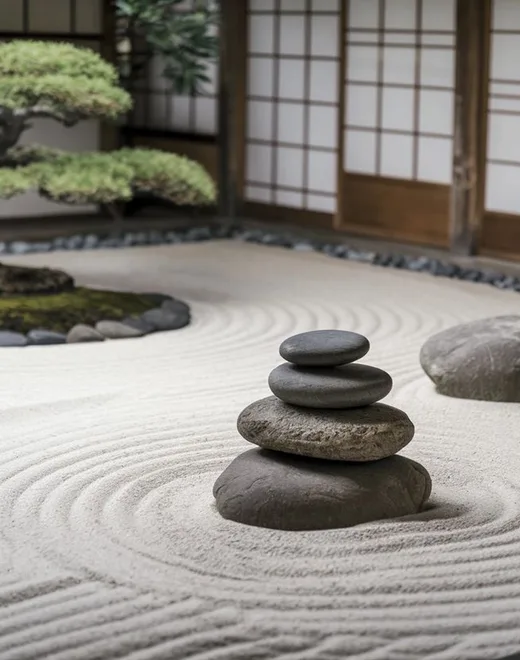The Four Noble Truths in Everyday Life: A Practical Guide
Apr 11, 2025 • 7 min read
Ever caught yourself thinking "I'll be happy when..."? Maybe it's when you get that promotion, find the perfect relationship, or finally reach your fitness goals. We all do this, setting up conditions for our happiness that keep moving just out of reach. This is exactly what the Buddha was talking about with the Four Noble Truths - not as abstract philosophy, but as a practical framework for understanding why we struggle and how we can find genuine contentment right here in our messy, everyday lives.
What Are the Four Noble Truths, Really?
Let's strip away the fancy language and religious trappings for a minute. The Four Noble Truths are basically a doctor's approach to our everyday dissatisfaction - here's the problem, here's why it happens, here's the good news that it can be different, and here's what you can do about it. It's like a practical diagnosis and treatment plan for the human condition.
Most of us move through life with a vague sense that something isn't quite right, even when things are going well. We might have everything we thought we wanted, but still feel like something's missing. Or we finally achieve a goal only to immediately start worrying about losing it or needing something else. This constant undercurrent of dissatisfaction is what the first noble truth points to.
Understanding this isn't about being pessimistic - it's about being honest about our experience so we can work with it more effectively. Just like a doctor needs an accurate diagnosis before treatment can begin, we need to clearly see the nature of our struggle before we can address it.
The First Truth: Stress Is Part of Life
Let's get practical about the first noble truth. We usually translate it as "life is suffering," which sounds pretty grim. But a better way to think about it is "stress and dissatisfaction are natural parts of being human." This shows up in everyday life in surprisingly ordinary ways.
Think about your morning routine. Maybe you wake up and immediately check your phone, feeling a little anxious about what emails came in overnight. Or you look in the mirror and wish something was different about your appearance. Or you get stuck in traffic and feel your blood pressure rising even though you know getting angry won't make the cars move any faster.
These aren't huge tragedies, but they're examples of the subtle stress and dissatisfaction we deal with all day long. Even pleasant experiences come with a hint of stress - enjoying a great meal while worrying about the calories, having a good time at a party while thinking about all the work you need to do tomorrow, or going on vacation while dreading the emails piling up.
Understanding this truth in our daily lives isn't about wallowing in negativity. It's about acknowledging that stress and dissatisfaction are normal experiences rather than signs that something is wrong with us or that we're failing at life.
The Second Truth: Where This Stress Comes From
Here's where things get interesting - and practical. The second noble truth points to the cause of our stress, and it's not what most people think. It's not our job, our relationship status, or the state of the world (though these can certainly contribute). The root cause is our relationship with what's happening.
The Buddha pointed to craving and aversion as the main sources of our stress. In modern terms, this means our habit of either wanting things to be different than they are or trying to hold onto things that are naturally changing. This shows up in countless ways throughout our day:
- Scrolling social media when we're bored, looking for something to make us feel better
- Pushing away uncomfortable emotions because we think we shouldn't feel them
- Trying to control situations or people that aren't ours to control
- Holding onto past experiences or worrying about future ones instead of living now
What makes this truth so practical is that once we see how our own mental habits contribute to our stress, we have something we can work with. We can't always change external circumstances, but we can change how we relate to them.
The Third Truth: There's a Way Out
Here's some good news - the third noble truth tells us that we don't have to stay stuck in these patterns. This isn't just positive thinking; it's based on a fundamental understanding that our dissatisfaction isn't built into reality itself but comes from how we relate to our experience.
Think of it like this: If you're holding a heavy weight with a tense arm, you're going to get tired pretty quickly. But if you learn to hold it differently, or maybe set it down sometimes, the same weight becomes manageable. Similarly, we can learn to hold our experiences differently, creating less stress and struggle for ourselves.
This truth plays out in practical ways every day. Maybe you notice that when you stop fighting against traffic and just accept that it's slow today, your stress level drops dramatically. Or you might find that accepting a difficult emotion rather than trying to push it away actually helps it pass more quickly. These small moments of letting go give us a taste of what's possible on a larger scale.
The Fourth Truth: The Practical Path
This is where the rubber meets the road. The fourth noble truth outlines eight areas of practice that help us live with more ease and less struggle. But instead of treating them like commandments, let's look at how they apply to real life situations.
Right View in Daily Life
Right view isn't about adopting beliefs - it's about seeing clearly what causes stress and what brings peace in your own experience. For instance, notice what happens when you believe the thought "I should be further along in life by now." How does that affect your stress level? What happens when you question that belief?
Start paying attention to the stories you tell yourself about your life, your work, and your relationships. Which ones create more stress? Which ones lead to more peace? This isn't about positive thinking - it's about seeing clearly what actually works in your own experience.
Right Intention and Action
These aspects of the path show up in the countless small choices we make each day. When you're about to send that angry email, can you pause and consider your true intention? When you're tempted to gossip about a coworker, can you choose a different action that aligns more with your values?
Practical Applications in Modern Life
Let's look at how these truths help with common modern challenges:
Digital Stress and Social Media
The four noble truths offer valuable insight into our relationship with technology. Notice how the endless scroll of social media reflects the truth about craving - always wanting the next post, the next like, the next dopamine hit. But also notice how simply being aware of this pattern can help you make different choices.
Try this experiment: Next time you reach for your phone, pause and notice what you're really looking for. Is it connection? Entertainment? Escape from discomfort? Just this awareness can help break the automatic pattern and give you more choice about how to respond to that underlying need.
Workplace Challenges
Modern work life offers plenty of opportunities to practice with these truths. When dealing with difficult colleagues, tight deadlines, or overwhelming workloads, notice how resistance to what's happening often adds an extra layer of stress to already challenging situations.
Relationships and Communication
The four noble truths can transform how we handle relationship challenges. Notice how much relationship stress comes from wanting people to be different than they are, or trying to control situations we can't control. What happens when you bring acceptance to these situations while still maintaining healthy boundaries?
Common Challenges and How to Work with Them
The Challenge of Consistency
One of the biggest obstacles people face is maintaining awareness in daily life. It's easy to understand these truths intellectually but harder to remember them in the heat of the moment. Here are some practical strategies:
- Set regular reminder points throughout your day (like every time you check your phone or start your car)
- Create simple check-in practices during natural transitions in your day
- Use challenging situations as wake-up calls to practice
Working with Strong Emotions
When intense emotions arise, it's particularly challenging to remember and apply these teachings. This is where having a regular practice becomes crucial. Start working with small irritations and build your capacity gradually.
Moving Forward with These Teachings
The beauty of the four noble truths is that you can start working with them exactly where you are. You don't need to wait until you're less busy, less stressed, or more prepared. In fact, your current challenges are the perfect laboratory for practice.
Begin by choosing one area of your life where you experience regular stress or dissatisfaction. Notice how the four noble truths play out in that situation:
- How do you experience stress or dissatisfaction there?
- What patterns of wanting or resistance can you identify?
- Can you find moments of relief when you let go of fighting with reality?
- What practical steps could you take to work differently with this situation?
Remember, this isn't about achieving some perfect state of perpetual peace. It's about developing a more skillful relationship with your actual, messy, complicated life. Each moment of awareness, each small choice to respond differently, is practice.
The four noble truths aren't just ancient philosophy - they're practical tools for working with the challenges we face every day. By understanding and applying them in our lives, we can gradually move from struggle to greater ease, from resistance to acceptance, and from stress to more sustainable ways of living.
DISCLAIMER: All articles, information, and other content on our website is for informational purposes only and is not a substitute for medical advice, diagnosis, or treatment. If you are experiencing mental health challenges or have concerns about your mental or physical health, please consult a qualified healthcare professional. Learn more →


